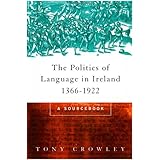
Average Reviews:

(More customer reviews)Are you looking to buy The Politics of Language in Ireland 1366-1922: A Sourcebook? Here is the right place to find the great deals. we can offer discounts of up to 90% on The Politics of Language in Ireland 1366-1922: A Sourcebook. Check out the link below:
>> Click Here to See Compare Prices and Get the Best Offers
The Politics of Language in Ireland 1366-1922: A Sourcebook ReviewThis is a really interesting compilation of source material, most of which is basically impossible to find in any other way. You really get an great overview here, of the preposterous things real people actually said, on the topic of eradicating the native tongue of an entire nation of people.Tony Crowley has assembled almost 150 short selections here, dating from 1366 to 1922. They are divided up chronologically, (not thematically), into six sections. Each section has its own little introduction. Make sure you spend some time on all the introductions, unless you happen to have a serious background in this area. If you fail to do this, you'll miss out on the significance of what you're seeing here. In fact, I'd recommend making an effort to read each introduction through twice, and supplementing your reading with some background research. I recommend a few pretty good books to look at, at the end of this review. I'm not an expert though, so you should definitely do some shopping around on your own.
The selections are usually very concise, averaging only about a page and a half. Some pages contain two or even three selections. Other selections go on for as long as six or seven pages. The selected quotes are drawn from sources including various translations of the bible, law codes, cultural commentary, plays, and more. There are a wide range of authors represented, both Irish and English. Some quotes come from well known figures such as Jonathan Swift, Shakespeare, Ben Jonson, Daniel O'Connell, Yeats, or Synge. (The Daniel O'Connell entry is not what you might imagine it should be -- check it out. It's dated 1833.)
One interesting thing I noticed is that it seems that one of the major forces at work, in the early years of outlawing Irish, was a form of cultural self-defense by the English. The English were afraid of losing their colonial administrators to "Gaelicisation," by means of which Englishmen became more Irish in terms of speech, conduct, dress, etc. I never knew this to have been the case. It's really interesting to read about. The English probably had very little idea, when they first started legislation to keep Irish "outside the Pale" where English predominated, how far things would go.
Recommendations for further reading: If you'd like some further reading, to give you a better sense of context for this great book, I would like to recommend that you look at the following titles. For a good Irish historical atlas, try "Atlas of Irish History," by Sean Duffy. For a beautifully written, excellent survey of Irish literature over the centuries, ask your local librarian to help you track down a copy of "The Irish Tradition" by Robin Flower. There seem to be a number of good, concise histories of Ireland, but I'm just starting to get a sense of their relative merits. You're on your own there! ... offers customer reviews of several that look pretty good, so I recommend that you shop around in that manner. Finally, for a very interesting book about the historical perceptions of the Irish language in the United States, I'd like to recommend that you look at "The Irish Language in the United States: A Historical, Sociolinguistic, and Applied Linguistic Survey," by Thomas W. Ihde.The Politics of Language in Ireland 1366-1922: A Sourcebook OverviewFor almost a thousand years language has been an important and contentious issue in Ireland but above all it reflects the great themes of Irish history: colonial, invasion, native resistance, religious and cultural difference.Collected here for the first time are texts on language from the date of the first legislation against the Irish: the Statute of Kilkenny, 1366, to the constitution of the Free State in 1922. Crowley'sintroduction connects these texts to current debates, giving The Belfast Agreement as a textual example and illustrating that the language debates continue today. Divided into six historical sections with detailed editor's introductions, this unique sourcebook includes familiar cultural texts such as essays and letters by Yeats along side less familiar writings including the Preface to the New Testament in Irish. (1602)Providing direct access to original texts, this is an historical resource book which can be used as a case study in the relations between language and cultural identity.
Want to learn more information about The Politics of Language in Ireland 1366-1922: A Sourcebook?
>> Click Here to See All Customer Reviews & Ratings Now
0 comments:
Post a Comment